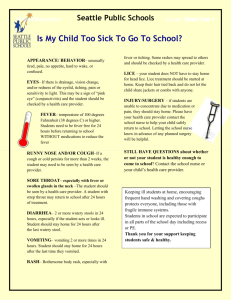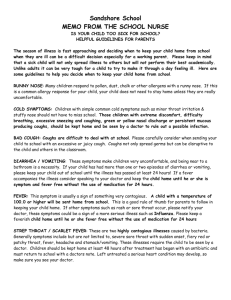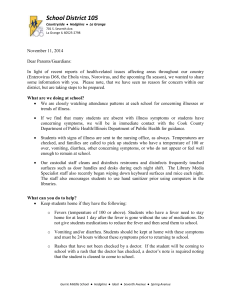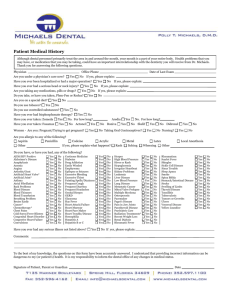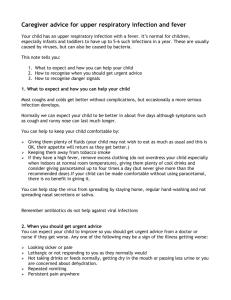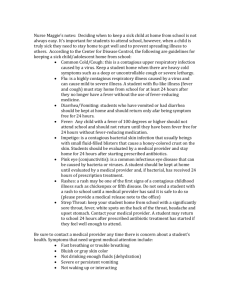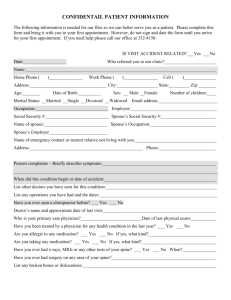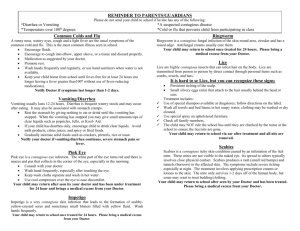A Message from Your School Nurse
advertisement
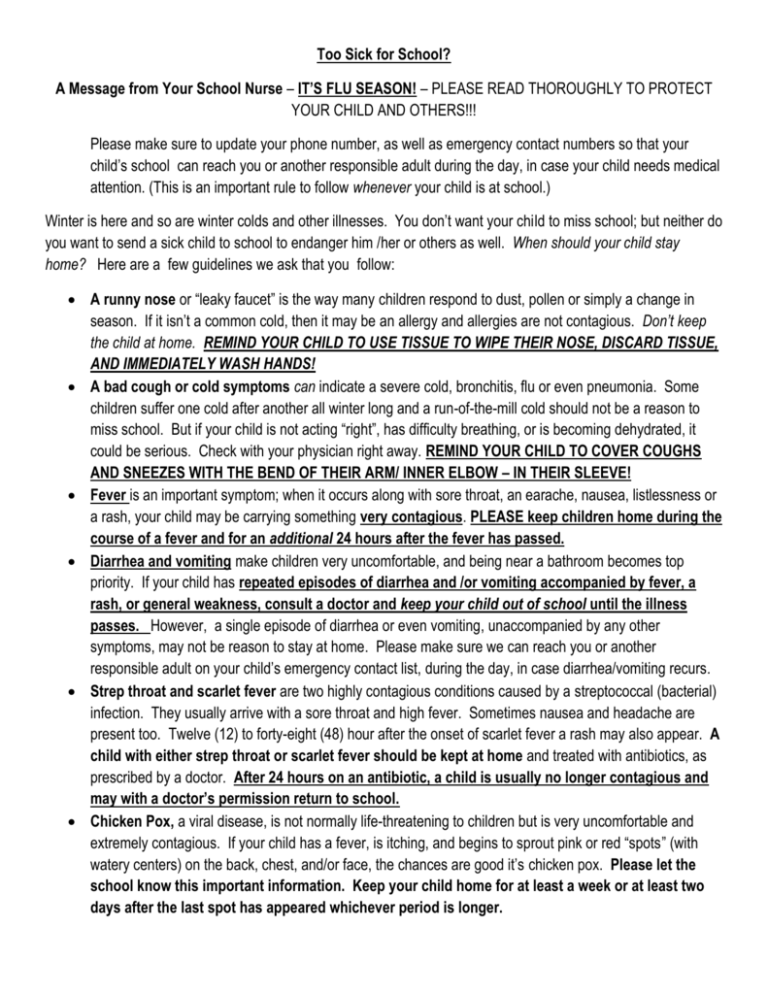
Too Sick for School? A Message from Your School Nurse – IT’S FLU SEASON! – PLEASE READ THOROUGHLY TO PROTECT YOUR CHILD AND OTHERS!!! Please make sure to update your phone number, as well as emergency contact numbers so that your child’s school can reach you or another responsible adult during the day, in case your child needs medical attention. (This is an important rule to follow whenever your child is at school.) Winter is here and so are winter colds and other illnesses. You don’t want your child to miss school; but neither do you want to send a sick child to school to endanger him /her or others as well. When should your child stay home? Here are a few guidelines we ask that you follow: A runny nose or “leaky faucet” is the way many children respond to dust, pollen or simply a change in season. If it isn’t a common cold, then it may be an allergy and allergies are not contagious. Don’t keep the child at home. REMIND YOUR CHILD TO USE TISSUE TO WIPE THEIR NOSE, DISCARD TISSUE, AND IMMEDIATELY WASH HANDS! A bad cough or cold symptoms can indicate a severe cold, bronchitis, flu or even pneumonia. Some children suffer one cold after another all winter long and a run-of-the-mill cold should not be a reason to miss school. But if your child is not acting “right”, has difficulty breathing, or is becoming dehydrated, it could be serious. Check with your physician right away. REMIND YOUR CHILD TO COVER COUGHS AND SNEEZES WITH THE BEND OF THEIR ARM/ INNER ELBOW – IN THEIR SLEEVE! Fever is an important symptom; when it occurs along with sore throat, an earache, nausea, listlessness or a rash, your child may be carrying something very contagious. PLEASE keep children home during the course of a fever and for an additional 24 hours after the fever has passed. Diarrhea and vomiting make children very uncomfortable, and being near a bathroom becomes top priority. If your child has repeated episodes of diarrhea and /or vomiting accompanied by fever, a rash, or general weakness, consult a doctor and keep your child out of school until the illness passes. However, a single episode of diarrhea or even vomiting, unaccompanied by any other symptoms, may not be reason to stay at home. Please make sure we can reach you or another responsible adult on your child’s emergency contact list, during the day, in case diarrhea/vomiting recurs. Strep throat and scarlet fever are two highly contagious conditions caused by a streptococcal (bacterial) infection. They usually arrive with a sore throat and high fever. Sometimes nausea and headache are present too. Twelve (12) to forty-eight (48) hour after the onset of scarlet fever a rash may also appear. A child with either strep throat or scarlet fever should be kept at home and treated with antibiotics, as prescribed by a doctor. After 24 hours on an antibiotic, a child is usually no longer contagious and may with a doctor’s permission return to school. Chicken Pox, a viral disease, is not normally life-threatening to children but is very uncomfortable and extremely contagious. If your child has a fever, is itching, and begins to sprout pink or red “spots” (with watery centers) on the back, chest, and/or face, the chances are good it’s chicken pox. Please let the school know this important information. Keep your child home for at least a week or at least two days after the last spot has appeared whichever period is longer. Measles (or Rubella) is a viral infection that attacks a child’s respiratory system, causing a dry, hacking cough, general weakness, inflamed eyes, and fever. If these symptoms appear, keep your child at home and consult your doctor right away to avert more serious complications. If it is confirmed as measles, please let the school know so we may be alert to symptoms appearing among other children at school. The measles rash of tiny hard red bumps will appear on the child’s face, behind the ears, and down the body. Your doctor may advise you to keep your child home for several days after the rash has disappeared. Conjunctivitis or pink eye is highly contagious and uncomfortable, so take heed when your child complains of an eye or eyes burning, itching, and producing a whitish discharge. Minor cases (caused by a virus) and severe cases (caused by bacteria) require treatment with prescription eye drops. It is best to keep your child home until your doctor says it is all right to return to school. Ear infections, unless properly treated, can cause permanent hearing damage. Here again you should follow the 24 hour rule for fever and antibiotic therapy. Lice and mites, once brought into a home or school, can quickly produce an epidemic of itching and scratching. Lice are tiny parasites (like ticks) that thrive on the warm damp scalps of children and feed by sucking blood from the scalp. Caution your child (ren) against sharing anybody else’s combs, brushes, or clothing, especially hats. Mites are tiny insects in the same class as spiders and ticks; they irritate the skin and cause scabies. If your child becomes a “host” to lice or mites, check with your doctor or school nurse for the most effective way to disinfect your child and your home or environment. To better serve you and your children please keep a list of current phone numbers and emergency contact information available. If your child has a health concern please let the school know and fill out a current Health Assessment Record in the school office. If you need help finding a doctor or acquiring medical insurance please contact your school nurse. If your child needs to take medication while at school a Parent/Physician Authorization form must be filled out and signed by the parent and doctor. Please ask the physician to fill this out at your visit so as to save you a return trip. These forms are available in the office and on the Tuscaloosa County Schools website (www.tcss.net) under health services. VERY IMPORTANT*****We have been asked by our Local and State Health Departments to requests that parents who take their child to the Doctor with flu-like symptoms, ask your child’s Doctor to send a specimen to the State. Please notify the school nurse as soon as the Doctor has confirmed that your child has flu. Please feel free to contact your child’s school nurse with questions. -Tuscaloosa County School System Health Services
